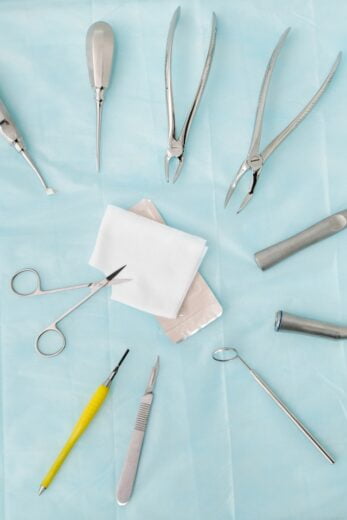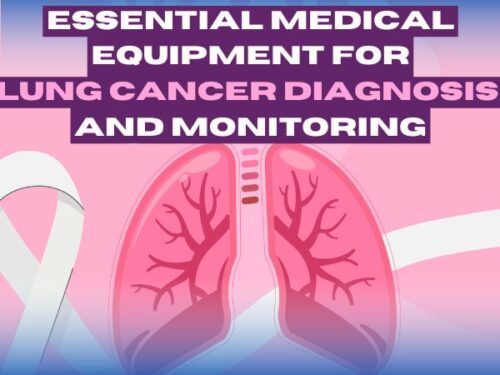According to the statistics reported by the National Institute of Health (NIH) published in 2020, nearly 310 million major surgical procedures are conducted on an annual basis at the global level. These procedures include cesareans, organ and joint replacement surgeries, cardiac procedures, etc. For this purpose, various types of medical equipment are needed to aid the surgeries. One of the most important of these items is the medical scissors.
Owing to their frequent use, different types of medical scissors are manufactured and marketed. Depending upon the kind of surgery to be conducted, a physician chooses the right type of scissor. Let us take a look at the process of choosing suitable medical scissors along with their basic anatomy.

Anatomy of Medical Scissors
Medical scissors are usually prepared from high-grade medical stainless steel as well as hardened tungsten carbide. Newer approaches are being made to design and market disposable scissors which can eliminate the need for sterilization. Whichever material is used, a medical scissor is an assemblage of the following basic parts:
· Blade:
Blade is the part of a scissor was has the responsibility of performing the job of cutting during a medical procedure. With different types of scissors, the length of this blade varies.
· Ring handles:
Ring handles help the physician to hold the scissor firmly.
· Hinge:
A hinge is the point where both the blades of the scissor are connected. It serves as the point of movement as well.
· Shank:
Shank is the distance between the hinge and ring handles which gives the scissor a suitable length.
Scissors for Bariatric Procedures
Bariatric surgeries are weight-loss surgeries which include gastric bypass, Roux-en-Y gastric bypass, gastric banding, as well as sleeve gastrectomy. For these procedures, the following medical scissors are given preference:
· Sklar Bariatric Tungsten Carbide Z-Type Scissors:
Sklar Bariatric Tungsten Carbide Z-Type Scissors are premium-grade scissors. These are made using tungsten carbide which is the hardest known alloy. They are curved and have blunt tips. The working surface type is smooth. These scissors are reusable after sterilization.
· Sklar Bariatric Metzenbaum-Nelson Scissors:
Sklar Bariatric Metzenbaum-Nelson Scissors are ideas for bariatric surgeries. These possess blunt tips which are blunt in texture along with permanently-bonded tungsten carbide inserts. These are latex-free and non-sterile. Although these can be made free from microbes after sterilization. Metzenbaum-Nelson scissors come in sizes ranging between 12 to 20 inches.

All of the medical scissors mentioned in this article, along with other medical supplies, can be purchased from Health Supply 770 at the most affordable prices.
Furthermore, the prices are even lower during the weekly deals they offer on certain items. Do check them out for stocking up on some essential supplies.
Cardiovascular Procedures
Conducting a cardiovascular surgery is a delicate job. Along with the precision of the surgeon, medical instruments should also be of top quality for successful heart surgery.
For this purpose, specialized scissors such as Sklar Cardiovascular Potts-Smith Scissors can be employed. These scissors are latex-free, angled, and affixed with a smooth and sharp tip.
The preparation material is stainless steel therefore the scissors are durable and can be sterilized. Potts-Smith scissors are usually employed for opening and trimming vessels.
Material Matters: Stainless Steel vs. Tungsten Carbide
Two of the most widely employed substances for the manufacturing of medical scissors are stainless steel and tungsten carbide. Each of these comes with different advantages and disadvantages which have been listed in the following table:
| Stainless steel scissors | Pros | Cons |
| Sharp and robust | Less rigid than tungsten | |
| Corrosion-resistant | Lesser durability | |
| Wear resistant | Cutting edge dulls faster | |
| Low cost and easy to sterilize | Hard to manufacture | |
| Tungsten carbide scissors | 5X harder than stainless steel scissors | Brittle in nature, cannot stand a strong impact |
| Highly durable and chemically inert | Can cause skin allergy | |
| Sharper blades and long-lasting cutting edge | Can be damaged during sterilization | |
| Good for cutting cartilage and applying repeated cuts | Higher cost |
The Importance of Ergonomics
Ergonomics measures the efficiency of a person while working. In the hand of a surgeon, the usability of a medical scissor is greatly affected by its design.
Specifically, the handle of a scissor should be of a suitable size so that the surgeon can comfortably hold it for a longer period. This enhanced grip also increases the performance efficiency of the surgeon as the cutting and peeling of the tissues is quick and easy.
Moreover, the overall time of the surgery is also reduced. Additionally, the blades of the surgical scissors should be sharp and strong.
Maintenance and Sterilization of Medical Scissors
medical scissors, like other medical supplies, need to be properly cleaned and sterilized after every use to minimize the risk of contamination.
In the first step, a scissor is washed with a suitable detergent solution using a non-linting cloth. Followed by washing, a clean, non-linting cloth is employed to dry them.
Apart from detergents, another way to clean medical scissors is the use of alcohol-based wipes. Furthermore, steam and hot water are also effective against microbes including bacteria and viruses which may be present on the blades of a medical scissor. For this purpose, the instrument is to be dipped into boiling water for a few minutes.
Conclusion
Medical scissors have vast applications in the field of surgery as almost no procedure can be done without the need to cut a tissue.
These medical scissors come in varying sizes and multiple materials are used to manufacture them. In spite of being different in nature, both stainless and tungsten carbide provide good quality medical scissors which, however, differ in their overall strength and sharpness, delivering their intended role efficiently.
As the performance of a surgeon during a surgery not only depends on skill but also the instrument being used, medical scissors are designed while keeping in mind the comfort of the surgeon. In a nutshell, medical scissors might be the most employed surgical tool in healthcare facilities.
References:

PhD Scholar (Pharmaceutics), MPhil (Pharmaceutics), Pharm D, B. Sc.
Uzma Zafar is a dedicated and highly motivated pharmaceutical professional currently pursuing her PhD in Pharmaceutics at the Punjab University College of Pharmacy, University of the Punjab. With a comprehensive academic and research background, Uzma has consistently excelled in her studies, securing first division throughout her educational journey.
Uzma’s passion for the pharmaceutical field is evident from her active engagement during her Doctor of Pharmacy (Pharm.D) program, where she not only mastered industrial techniques and clinical case studies but also delved into marketing strategies and management skills.

















